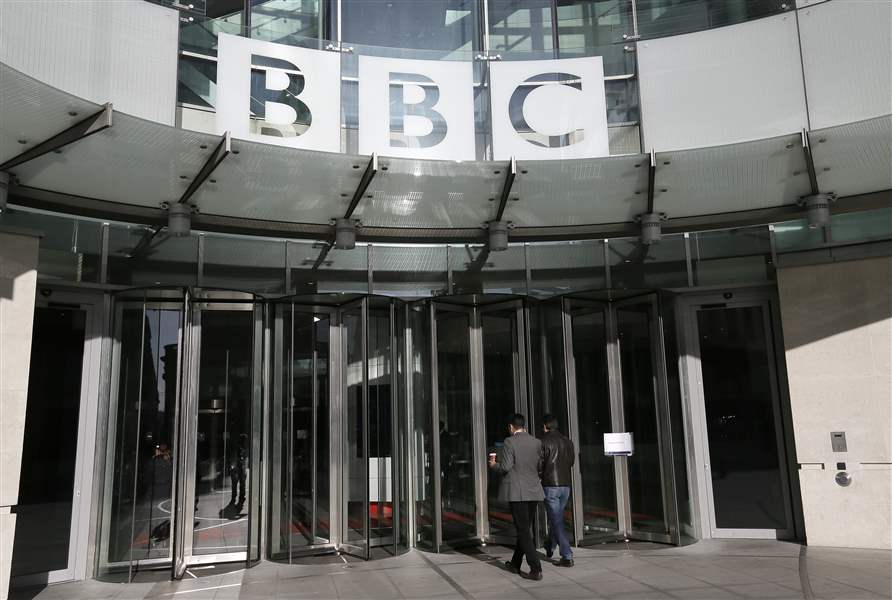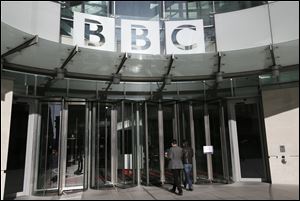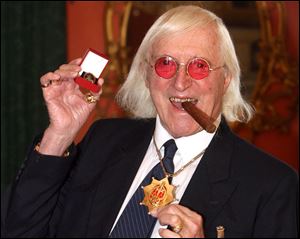
BBC reform demanded after scandal
Change is key for public trust, chairman says
11/12/2012
The BBC, headquartered in this in London building, has served as the voice of Great Britian, exporting its culture to a worldwide audience.
ASSOCIATED PRESS

The BBC, headquartered in this in London building, has served as the voice of Great Britian, exporting its culture to a worldwide audience.
LONDON — Britain’s BBC could be doomed unless it makes radical changes, the head of its governing trust said, after its director general quit to take the blame for the airing of false child sex abuse allegations against a former politician.
Lord Chris Patten, BBC Trust chairman, said on Sunday that confidence must be restored if the publicly funded corporation was to withstand pressure from rivals.
“If you’re saying, ‘Does the BBC need a thorough structural radical overhaul?’, then absolutely it does, and that is what we will have to do,” Lord Patten, a onetime senior figure in Prime Minister David Cameron’s Conservative Party and the last British governor of Hong Kong, told BBC television.
“The basis for the BBC’s position in this country is the trust that people have in it,” Lord Patten said. “If the BBC loses that, it’s over.”
It is hard to overstate the importance of the BBC in British society. Its influence stretches throughout the former British empire and beyond.
Over the years, the BBC has been behind almost all of the United Kingdom’s broadcast milestones, serving as a voice for the British nation.
BBC’s airwaves have carried the clanging of Big Ben’s bells, wartime messages from Winston Churchill, and the music of the Beatles — exporting British culture to a global audience.
Funded by an annual license fee levied on all TV viewers, the BBC has long been resented by its commercial rivals who argue it has an unfair advantage and distorts the market.
On Saturday, George Entwistle resigned as the BBC’s director general, just two months into the job, to take responsibility for the child sex allegation on the flagship news program Newsnight.
A witness in the report, who says he suffered sexual abuse at a care home in the late 1970s, said on Friday that he had misidentified the politician, Lord Alistair McAlpine.
Newsnight admitted it had not shown the witness a picture of Lord McAlpine nor approached Lord McAlpine for comment before going to air.
Already under pressure after revelations that a longtime star host, the late Sir Jimmy Savile, was a pedophile, Mr. Entwistle conceded on the BBC morning news that he had not known — or asked — who the alleged abuser was until the name appeared in social media.
The BBC, celebrating its 90th anniversary, is affectionately known in Britain as “Auntie” and is respected around much of the world.
But with 22,000 staff members working at eight national TV channels, 50 radio stations, and an extensive Internet operation, critics say it is hampered by a complex and overly bureaucratic management structure.
Journalists said the problems had become worse under Mr. Entwistle’s predecessor, Mark Thompson, who took over in the wake of the last major crisis to hit the corporation. He is to become chief executive of the New York Times Co. today.
In the previous crisis, both director general and chairman were forced out after the BBC was criticized by a public inquiry over a report alleging government impropriety in the buildup to war in Iraq. The inquiry led to major organizational changes.
One of the BBC’s most prominent figures, Newsnight anchor Jeremy Paxman, said that since the Iraq report furor, management had become bloated while cash had been cut from program budgets.
Prime Minister Cameron appeared ready to give the BBC the benefit of the doubt, saying that “one of the great institutions of this country” could reform and deal with its failings, according to sources in his office.
Lord Patten, who must find a new director general to sort out the mess, agreed that management structures had proved inadequate.
“Apparently decisions about the program went up through every ... layer of BBC management, bureaucracy, legal checks — and still emerged,” he said.
“One of the jokes I made, and actually it wasn’t all that funny, when I came to the BBC ... was that there were more senior leaders in the BBC than there were in the Chinese Communist Party.”
Lord Patten ruled out resigning himself, but other senior jobs are expected to be on the line, and BBC supporters fear investigative journalism will be scaled back.
Lord Patten said he expected to name Mr. Entwistle’s successor in weeks, not months.
Among the immediate challenges are threats of litigation. Lord McAlpine, a close ally of former Prime Minister Margaret Thatcher, has indicated he will sue for damages.
Claims for compensation are also likely from victims who say Sir Jimmy, one of the most recognizable personalities on British television in the 1960s, 70s, and 80s, sexually abused them as children, sometimes on BBC premises.
Two inquiries are under way, looking at failures at Newsnight and allegations relating to Sir Jimmy.
Police have opened a major inquiry into him and victims’ allegations of a high-profile pedophile ring.
The broadcaster’s charter sets out that “trust is at the foundation of the BBC: we are independent, impartial, and honest.”
But public trust in the BBC has been declining for decades, according to polls, and the latest scandals are unlikely to help.
Mr. Entwistle may have quit, but observers say the BBC Trust, which ensures the broadcaster stays true to its public obligations, deserves scrutiny too.
Lord Patten is expected to lay out plans today for how to deal with the aftermath.

Chris Patten, Chairman of the BBC Trust walks out of the BBC headquarters to give a media interviews in London, Sunday, Nov. 11, 2012. The head of the BBC's governing body said Sunday the broadcaster needs a radical overhaul following the resignation of its chief executive in wake of a scandal over a botched report on child sex-abuse allegations. Chris Patten vowed to restore confidence and trust in the BBC, which is reeling from the resignation of George Entwistle and the scandals prompting his ouster. Entwistle resigned Saturday night amid a storm of controversy after a news program wrongly implicated a British politician in a child sex-abuse scandal, deepening a crisis sparked by revelations it decided not to air similar allegations against one of its own stars.(AP Photo/Alastair Grant)

The BBC Director General, George Entwistle, announces his resignation from the BBC outside New Broadcasting House in central London, after recent news program problems, Saturday Nov. 10, 2012. The BBC's director general had said earlier Saturday that it should not have aired a report that wrongly implicated a politician in a child sex-abuse scandal, admitting that the program further damaged trust in a broadcaster already reeling from the fallout over its decision not to air similar allegations against one of its star hosts. George Entwistle's comments followed an embarrassing retreat for the BBC, which apologized Friday for its Nov. 2 "Newsnight" TV show on alleged sex abuse in Wales in the 1970s and 1980s. During the program, victim Steve Messham claimed he had been abused by a senior Conservative Party figure. The BBC didn't name the alleged abuser, but online rumors focused on Alistair McAlpine, a Conservative Party member of the House of Lords. On Friday, he issued a fierce denial and threatened to sue. (AP Photo/ Max Nash)